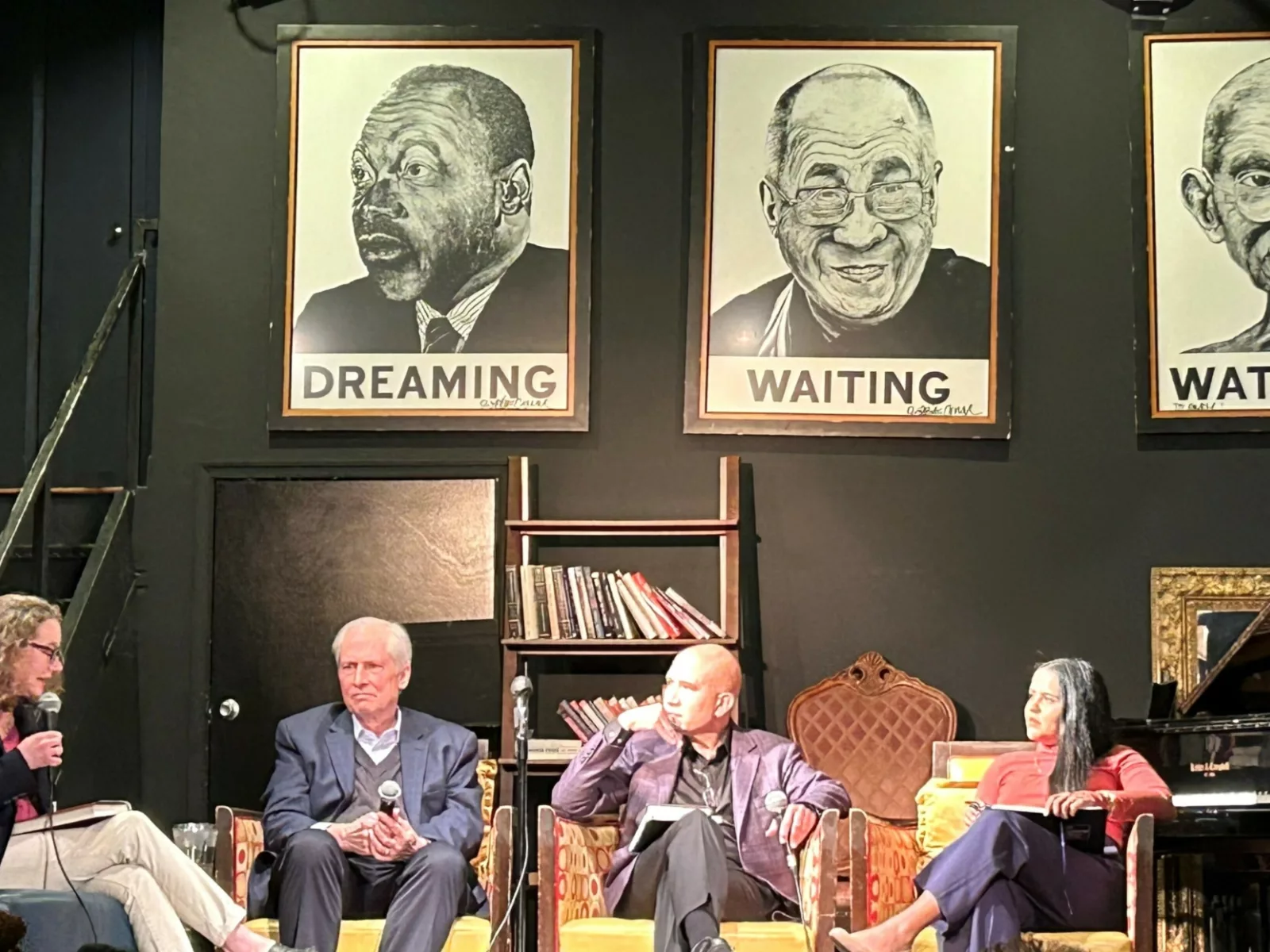On any given day in the United States, nearly half a million people sit in jail on charges for which they have not been convicted. That’s because most jurisdictions across the country use a money bail system in which the court sets an amount of money a person must pay to be released before trial. Money bail is meant to ensure that defendants appear in court. But, in effect, its result is a discriminatory structure that means that a person’s wealth determines whether they are detained, one that flouts the American judicial principle of “innocent until proven guilty.”
Micah Derry, formerly the Ohio state director of Americans for Prosperity, has spent his career devoted to ending that problem. Driven by a personal experience with addiction that he says could easily have landed him in serious legal trouble, he believes it is his duty to advocate for those caught up in the criminal justice system. In his home state of Ohio, he formed a bipartisan coalition to advocate for a bill, introduced in the Ohio House and Senate this May, that would overhaul the money bail system. Now, he is working with Arnold Ventures in its mission to eliminate unjust pretrial detention state by state and create a justice system where jail is only used when absolutely necessary. We spoke to Derry, bail reform campaign director, about the injustices of money bail, the political realities of forming a bipartisan coalition, and how advocates can get the legislative wins they want.
This conversation has been edited and condensed for clarity.

Arnold Ventures
Why is bail reform important?

Micah Derry
Most things that manifest themselves as constitutional crises don’t just appear overnight. They begin slowly and erode away at our understanding of our rights as American citizens. The use of money bail moved from being a motivation to help ensure people show up for their court hearings to being a forcible means to hold someone before they’ve been convicted of a crime. That phenomenon has grown over time, particularly since the early 1960s. Money bail by its very nature unduly targets those with the least stability in their lives. Everything they have that allows them to be strong contributors to society and pursue their personal American Dream — for example their children, house, job, and transportation — can all be lost in as little as 72 hours of incarceration, and for offenses as minor as drug possession or driving with a suspended license. Using this ill-advised tool for that kind of detention perpetuates cycles of poverty and makes success seemingly unreachable for those who have experienced an encounter with the criminal justice system. We have to address that to ensure that our constitutional rights are protected.

Arnold Ventures
What is your personal connection to this issue?

Micah Derry
My story is that right before college, I had a brain hemorrhage. I didn’t have health insurance, and I went deep into debt. I had a neurosurgeon who chose not to operate, but he put me on an aggressive pain management regimen that included Oxycodone, Percocet, and Vicodin. When they cut off my prescriptions, I started self-medicating. Within a couple of years, I was homeless and a full-blown addict.
It was because the right people came along that I was able to find my footing again. A retired couple adopted me, and they reminded me of the life lessons that we all learn as kids. The biggest lesson was that no problem has to be permanent. When I was in active addiction, I got away with a lot through a combination of luck and knowing the right people when I had close calls with the law. The majority of people I hung out with ended up dying of overdoses or with permanent records. They weren’t bad people. They had a problem.
Looking at the problems with our criminal justice system today, I see that many people’s first meaningful encounter is when they face the realization that they can’t even prepare their own defense because they don’t have the money to get out from behind bars before trial. I feel like I owe it to them to work on this issue, because I got lucky.

Arnold Ventures
What is the ideal model of bail reform legislation?
There’s a difference between the ideal in a perfect world and the ideal within the existing political reality. That reality varies from state to state. What’s critical is to assess the landscape, what unique contributors are driving incarceration, what’s driving arrests, and what’s driving sentencing. I come from Ohio. The political realities here are different from those in other states, and getting rid of money bail is not within the realm of current political reality. However, it’s possible to place a cap on the percentage of someone’s assets that can be applied as bail. It’s possible to require a hearing within 24 hours of arrest to determine whether or not a defendant is eligible for pretrial release. It’s possible to set the amount of money bail within 48 hours, if there will be money bail. For most states, the fundamental goal is to reduce or eliminate a system where wealth determines whether you’re detained pretrial.

Arnold Ventures
How did you contribute to the Ohio bail reform movement through your work with Americans for Prosperity, and what successes did you see there?

Micah Derry
Bail reform has been a discussion in Ohio for some time, but it never got any traction. A couple of years back, in my role as state director for Americans for Prosperity, I banded together with other right-of-center groups and started the Ohio Conservatives for Bail Reform coalition. That coalition worked closely with bipartisan advocates, including organizations like the ACLU of Ohio. When we brought together people of different political ideologies, that was the first time we started getting traction.
Meanwhile, Chief Justice Maureen O’Connor of the Ohio Supreme Court took a very bold action by calling for a task force to study how bail was being used in Ohio and make recommendations to guide future legislation. That didn’t result in massive bail reform, but it showed that a Republican Supreme Court chief justice recognized the problem. It set the foundation for bail to be a top priority this year, not just for the original group but for a much larger coalition across regions and political ideologies. That allowed us to introduce a bill in the Ohio House and Senate with more than 50 bipartisan sponsors and co-sponsors, something that in Ohio is almost unheard of.

Arnold Ventures
What is required to gain bipartisan support for bail reform, and are there ways that it’s already a bipartisan issue?

Micah Derry
Bail reform is absolutely a bipartisan issue. The most important thing for building bipartisan support is to recognize that not everyone speaks the same language. Progressives and conservatives need to hear different things. Take the example of incarceration levels. For progressives, especially those who are strong supporters of a decarceration policy approach, the idea is to put fewer people behind bars. They may offer much broader mercy than what conservatives of a law-and-order orientation will consider. Conservatives, on the other hand, might not look at the raw number of people who are behind bars, but they are concerned about the number who are incarcerated pretrial, have not been convicted of a crime, and are innocent in the eyes of the law. In Ohio, for example, if a defendant is unable to pay money bail, they’re incarcerated for an average of 29 days before they ever get to a hearing. The two top charges are minor drug possession and suspended drivers licenses. We’re holding people for a month for a crime that would, at worst, result in probation and a fine. Conservatives recognize that this is a breach of the Sixth Amendment to the Constitution, and individual liberty more broadly.

Arnold Ventures
What are the principles of pretrial justice that you’re aiming to support in your work with Arnold Ventures?

Micah Derry
One principle is that a highly functioning judicial system will have extremely limited use of pretrial detention. Part of the exceptionalism of the American story is that our system says you are innocent until proven guilty. A second principle is that if data does not support a policy, it should not be adopted. Pretrial services, supervision functions, anything that’s used in lieu of detention, must be evidence-based and community-oriented. (For more on the Arnold Ventures principles of pretrial justice, read the “Statement of Principles on Pretrial Justice and Use of Pretrial Risk Assessment.”)

Arnold Ventures
What are the policy goals Arnold Ventures advocates for bail reform?

Micah Derry
The goal is to reduce pretrial incarceration levels and reduce racial disparities among those detained pretrial. Ultimately, we want better, more accurate, and more just outcomes in the court system itself. We want to reduce the financial cost for the states and counties, but most important is to reduce the cost in human capital that gets lost when people spend weeks behind bars to get to a court hearing for misdemeanor charges.

Arnold Ventures
What are the best methods to build a successful on-the-ground campaign on this issue and get legislative wins?
The most important tactic is understanding local dynamics. Every state is different. For example, we’re working in Ohio and Michigan, which have full-time legislatures. Working in a full-time legislature means that you are constantly on the go, but nothing happens quickly. On the flip side, we have states that only meet for 90 days every two years, like Texas. That means a whole lot of work on the front end for a very quick flurry of action.
You need to exercise both grasstops and grassroots tactics. We need the direct voter contact activity that’s coming from Americans for Prosperity. Their phone banking, text banking, and mail program contact voters directly, make them aware of the impact of the status quo, and lay out the opportunities for a better state. Business leaders and community leaders have to be involved. But you also need personal stories. Policy decisions impacting our lives should be driven by data, but realistically speaking, numbers are not the language of the human heart. I often point to the example of Markcus Brown, a young Black man in Dayton, Ohio, who was arrested by police at a bus hub for wearing a hoodie and saggy pants — a violation of city transit policy. He sat in jail for nine days while his mom managed to get a loan and pay his $150 bail. During that time, he missed a job interview. He was ultimately banned from public buses, making it very difficult for him to get a job in the future. That’s just one example of some of the arbitrary and debilitating effects of money bail.
Today, at Arnold Ventures, we’re building a team to address this problem. The support for bail reform is strong and crosses the spectrum of ideological and political allegiances. This team consists of well-known national partners as well as key state and local partners. Laying the groundwork and creating the infrastructure for these groups to work together is the first and most important step to ending the harmful effects of money bail.


















